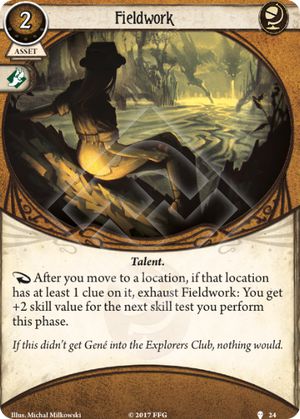- Q: If I move during a skill test (by, for instance, triggering the on Fieldwork) and trigger Fieldwork, does "next skill test" mean the next test I resolve or the next test I initiate. A: (the latter:) If you move during a skill test, Fieldwork will not grant a bonus for that skill test, it will grant a bonus for the next skill test you initiate.
자산
재능.
비용: 2.
당신이 장소 한 곳으로 이동한 후, 그 장소에 단서가 하나라도 있다면, ‘현장 조사’를 소진합니다: 이번 단계에 당신이 수행하는 다음 능력 테스트에서 능력값에 +2를 얻습니다.

FAQs
(from the official FAQ or responses to the official rules question form)Reviews
I completely agree with the other review, but I feel like it's worth mentioning that this card synergizes really well with Ursula Downs' ability. Both Fieldwork and said ability require you to move before you can activate them so you end up investigating after moving very often. It gets even more efficient once Pathfinder enters the mix. Almost every Ursula decklist on ArkhamDB includes this card. It's almost like a secondary signature card.
EDIT: as a side note on Fieldwork with Ursula, if you have Jake Williams in play, you can make a move action without taking an AoO. This means that you could move with an enemy engaged, use Fieldwork to evade that enemy, then move away (using your extra action to investigate if there's a clue left on that location) so that you can avoid becoming engaged again during the enemy phase. I hadn't thought of this before because I almost never actually play Jake. Becomes more efficient with Pathfinder, of course (though you can't activate Pathfinder if you have an enemy engaged iirc).
It also probably works well for Luke Robinson, though probably not to the same degree. You could use Dream-Gate to warp across a scenario and then use Fieldwork to investigate the new location. This also improves with Pathfinder, of course. That being said, I doubt that it is an auto-include in a Luke deck, as he can't necessarily Gate Box every turn, and he doesn't inherently get perks for movement.
Don't forget that it can also be used for non-investigation skill tests provided that you move to a location with at least one clue. In practice this is not terribly common. I have run into situations where I want to evade an enemy who's one location away to help a teammate. I have also used it for questing tests, though some of these need all of the clues gone before you can actually do them. Once again, Pathfinder helps a lot to make these acts more efficient.
So playing a fairly fast and lean Ursula deck right now and I realized something that made it worth writing down, while its obvious fieldwork is good with Ursula, the non obvious thing Ursula can do is trigger field work or her ability in any order, so you can enter a location and investigate it and have field work be a bonus to the next test that you perform, instead of just boosting the investigate.
I didn't realize until today that means if you have two field works you can stagger their triggers, one before Ursula's investigate and one after, which lets you either investigate with a +2 twice (often better then a single +4) or even investigate and then get a bonus against a treachery or special effect.
This card pretty nearly reads: Whenever you enter a location with a clue on it. Draw a Perception card. Sept the card cant draw anything but more Perception cards.
You can expect this to net you 3+ useful triggers if you draw it in the first 2 turns. If drawn later then the returns will depend on the map.
This card has a short and simple learning curve, try not to explore new places as a last action, also your friends should get used to leaving you some clue scraps, they shouldnt be investing cards and time into clues that you get a bonus on picking up.
Definitely worth the slot for folks who can freely slot Yellow cards. Probably not worth the dip for the Dunwich Investigators.
The biggest downside is that this might be a dead draw if drawn lategame.
-EDIT: A lightning gun Roland Banks will really appreciate this card as a way to keep up his clue gathering prowess.